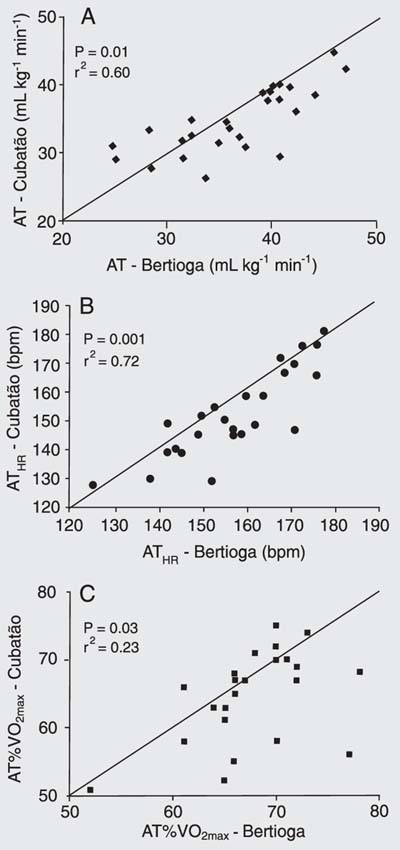The objective of the present study was to determine the impact of acute short-term exposure to air pollution on the cardiorespiratory performance of military fireman living and working in the city of Guarujá, São Paulo, Brazil. Twenty-five healthy non-smoking firemen aged 24 to 45 years had about 1 h of exposure to low and high levels of air pollution. The tests consisted of two phases: phase A, in Bertioga, a town with low levels of air pollution, and phase B, in Cubatão, a polluted town, with a 7-day interval between phases. The volunteers remained in the cities (Bertioga/Cubatão) only for the time required to perform the tests. Cumulative load 10 ± 2 min-long exertion tests were performed on a treadmill, consisting of a 2-min stage at a load of 7 km/h, followed by increasing exertion of 1 km h-1 min-1 until the maximum individual limit. There were statistically significant differences (P < 0.05) in anaerobic threshold (AT) between Cubatão (35.04 ± 4.91 mL kg-1 min-1) and Bertioga (36.98 ± 5.62 mL kg-1 min-1; P = 0.01), in the heart rate at AT (AT HR; Cubatão 152.08 ± 14.86 bpm, Bertioga 157.44 ± 13.64 bpm; P = 0.001), and in percent maximal oxygen consumption at AT (AT%VO2max; Cubatão 64.56 ± 6.55%, Bertioga 67.40 ± 5.35%; P = 0.03). However, there were no differences in VO2max, maximal heart rate or velocity at AT (ATvel) observed in firemen between towns. The acute exposure to pollutants in Cubatão, SP, caused a significant reduction in the performance at submaximal levels of physical exertion.
Air pollution; Firemen; Cardiorespiratory performance; Cardiopulmonary exercise testing


